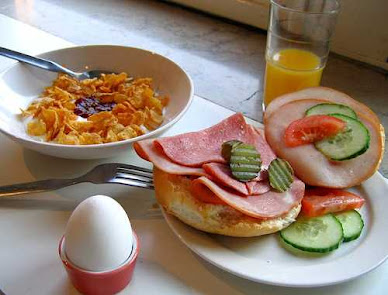
A low-fat vegetarian approach recognises that whole-food carbohydrates are fine; it's the fat in our diets that is the problem. New information suggests that fat in animal products and oils interferes with insulin's ability to move glucose into the cells.
Eating less fat reduces body fat. Less body fat allows insulin to do its job. However, choosing skinless chicken, skim milk and baked fish is not enough of a change for most people to beat diabetes. The new approach eliminates fatty foods and animal protein, such as meats, dairy products, and oils, and offers unlimited grains, legumes, fruits, and vegetables. One study found that 21 of 23 patients on oral medications and 13 of 17 patients on insulin were able to get off of their medication after 26 days on a near-vegetarian diet and exercise programme. During two- and three-year follow-ups, most people with diabetes treated with this regimen have retained their gains.
Type 1 diabetes and diet
- While people with type 2 diabetes can often reduce, and sometimes eliminate, medication when they lose weight and food and exercise are better controlled, those with type 1 diabetes will always need insulin. Even so, a good diet can minimise the amount of insulin required.
- Type 1 diabetes, formerly called "childhood onset diabetes," occurs when the pancreas stops producing insulin. The cause of type 1 diabetes remains elusive. Several studies have implicated cow's milk consumption as a possible contributor.
- When milk consumption patterns were examined across various nations, there was a strong correlation with the incidence of type 1 diabetes.
- It may be that milk proteins cause an autoimmune reaction in which the body mistakenly attacks its own insulin-producing cells.
A three-week trial is recommended for beginners.
Begin a vegan diet
- A vegan diet has no animal products at all: No red meat, poultry, pork, fish, dairy products, and eggs. Why? Animal products contain saturated fat, which is linked to heart disease, insulin resistance, and certain forms of cancer.
- They also contain cholesterol and, of course, animal protein. It may surprise you to learn that diets high in animal protein can aggravate kidney problems and calcium losses.
- All the protein you need can be found in whole grains, legumes, and even vegetables: that's where strong horses, bulls, and elephants get their protein.
- Although vegetable oils are healthier than animal fats, you will still want to keep them to a minimum. All fats and oils are highly concentrated in calories.
- A gram of any fat or oil contains nine calories, compared with only four calories for a gram of carbohydrate.
- The amount of fat we really need each day is quite small and readily available by eating whole foods. Avoid oily toppings and foods fried in oil. Limit olives, avocados, nuts, and peanut butter. Read labels, and choose foods with no more than 2-3 grams of fat per serving.
- Aim for at least 40 gms of fibre each day. Choose beans, vegetables, fruits, and whole grains (eg, whole wheat pasta, barley, oats, quinoa).
- Aim for at least 3 gms/fibre per serving on labels and 10 to 15 gms per meal. Start slowly.
- Expect a change in bowel habits (usually for the better). Gassiness from beans can be minimised with small servings and thorough cooking.









0 comments:
Post a Comment
Thanks for visiting, please drop a message if you liked it or you have some suggestions. So that we can improve and provide you better services.